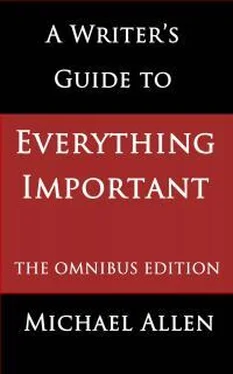There is then a physical response to the thought, such as trembling, or blushing.
And there may subsequently be conscious thought which leads to further action.
This process will be easier to understand if we consider a few examples.
Suppose a gun goes off, unexpectedly. You jump! Your heart starts to beat faster, your eyes open wide, and you stare around, wondering what the hell is going on. You feel an emotion called alarm, possibly fear. You may tremble and shake, even weep.
In this case, there is no conscious thought until after you feel the emotion, and there may not be much conscious thought even then; you may rush around in a panic.
Among scientists and philosophers, there is an unresolved debate about what the emotion actually is, and where it is located.
Is the emotion that we call fear contained in the physical symptoms – in the gasp, the trembling, the dry mouth, the staring eyes – or does it exist in the mind, as a thought? And which comes first? Does the mind experience emotion, which then brings about physical responses which may help to preserve and protect the organism (as when a frightened person prepares to run away)? Or do the automatic physical reflexes somehow cause an emotion in the mind?
This debate about what emotion is and its link with physical responses in the body has been going on for at least a hundred years.
In the early twentieth century, William James suggested that emotions are a feedback to the brain from an increased heart-rate, sweaty palms, and other physical phenomena. Carl Georg Lange developed a similar theory. These ideas were opposed by Walter Cannon, who argued that emotions originated in the brain and trickled down to the body.
These are, as I say, unresolved issues; nevertheless, it is possible to put together a hypothetical theory of emotion which provides writers with a working basis for doing their job.
Here is another example of how emotions are created. The simplest form of narrative is the anecdote, or joke, and these stories frequently generate emotion, usually amusement. Curiously enough, there has been some serious research done on jokes; a study was set up by the British Association for the Advancement of Science in 2001.
Here is a joke which is widely thought to be funny:
Sherlock Holmes and Dr Watson are going camping. They pitch their tent under the stars and go to sleep. Sometime in the night, Holmes wakes Watson up.
‘Watson, look up at the stars and tell me what you deduce.’
Watson says: ‘I see millions of stars, and even if a few of those have planets, it’s quite likely that there are some planets like Earth, and if there are a few planets like Earth out there, there might also be life.’
Holmes replies: ‘Watson, you idiot, somebody stole our tent!’
Ho ho ho.
Well now, let’s see what we can learn from this.
First, if you did indeed find this joke funny, then you will have experienced an emotion called amusement. Usually, this emotion is accompanied by a physical response called laughter (which itself is a very odd phenomenon, but we won’t go into that now). When a theatre audience really roars with laughter, it rocks backwards and forwards.
Second point: there is not much conscious thought involved in laughing at a joke. Usually, you either ‘get’ the joke more or less instantaneously or you don’t.
Third: please note that, in order to ‘get’ the joke, the audience needs to be able to understand the language in which it is written – in this case, English. If you couldn’t speak English, you wouldn’t be able to read the four paragraphs above which contain the joke, and you couldn’t possibly find them funny.
You may think this is too obvious to need stating, but lots of books and plays depend for their appreciation on being able to speak the language – so to speak. More on that later.
Fourth point: even if you do speak English, you really need to have the right frame of reference in order to appreciate the humour.
What that means is that you need to know a few pieces of background information; you need to have a particular kind of general knowledge, to enable you to assess the joke. In this case, you need to know something about Sherlock Holmes and Dr Watson in order to appreciate this particular piece of humour in full.
You might, possibly, find the story funny even if you had never heard of Holmes, the brilliant detective, and even if you had never seen one of those 1940s films in which Watson, the bumbling idiot, trails pathetically in Holmes’s wake. But you are much more likely to get the joke, and you are much more likely to laugh, if you know, already, that Watson is usually a clown.
(Incidentally, I once wrote some scripts for a television series of Holmes stories, and the producer specifically instructed me to make Watson a good deal smarter than usual. The actor was most grateful. This TV series, even more incidentally, was filmed in Warsaw. This was because of the then favourable exchange rate as between the Polish zloty and the Italian lira. Or so I was led to believe.)
Fifth, please note that a given stimulus does not generate the same emotional response over and over again; and few examples demonstrate this point better than a joke.
The Holmes story was apparently one of Michael Portillo’s favourites for beginning an after-dinner speech; and it was reportedly very successful for him. Mr Portillo was once a leading politician, now a TV personality.) Suppose that Portillo, having told the joke to an audience once, proceeded to tell it again. This time there might be nervous, puzzled laughter. He tells it again. And then again, and again, and again. Faced with such peculiar behaviour, an audience would eventually creep away in embarrassment, leaving the speaker alone in the dining-room.
This rapid fall-off in the capacity of a given stimulus to evoke a given emotional response is the reason why we have to write new novels and plays. If the old ones went on working, time after time, we wouldn’t have needed any new writers for at least the last hundred years. But this, fortunately for us writers, does not happen. Yes, there are some plays which can bear repeated viewing; but you really can’t attend a performance of Hamlet on every night of your whole life. Not while continuing to enjoy it.
We should not end this brief description of how emotion is created, both in life and in writing, without going a little further into the interaction which occurs between mind and body.
Candace Pert is a distinguished American scientist who has done research on the biochemistry of emotion. Modern technological developments have enabled us to examine the molecular basis of emotions, and Pert’s conclusion is that the molecules of emotion run every system in our body.
Pert was once asked where she stood on the James/Cannon controversy. In other words (as you will doubtless remember fro the discussion above), she was asked whether emotions begin in the body or in the mind. Pert replied that James and Cannon were both right – and yet neither of them was quite right.
In Pert’s view, there is a constant two-way traffic between the realms of mind and body; emotions exist as peptides and receptors in the body, i.e. as molecules, cells, and real pieces of flesh and blood, and they also exist as feelings which we experience in our minds.
If this seems a little complicated, don’t worry. It is simply common sense given the dignity of scientific backing. We all know perfectly well that there is an interaction between body and mind. When we feel ill we feel miserably unhappy; and when we feel miserably unhappy we can easily fall ill. There is clear evidence that stress suppresses the immune function.
If you’re feeling depressed, it would a smart move to go for a walk in the fresh air. Your Grandma told you this, and Grandma was right. Even better than a walk is a run. Allegedly. Haven’t tested the hypothesis myself.
Читать дальше












